Key takeaways:
- Family values serve as a guiding force in personal relationships, fostering trust, support, and connection during challenges.
- Animated films play a significant role in shaping cultural narratives, teaching valuable morals and lessons while promoting empathy and cultural understanding.
- Engaging with animated stories facilitates meaningful family discussions and reinforces the application of life lessons in everyday situations, enhancing family dynamics and individual growth.
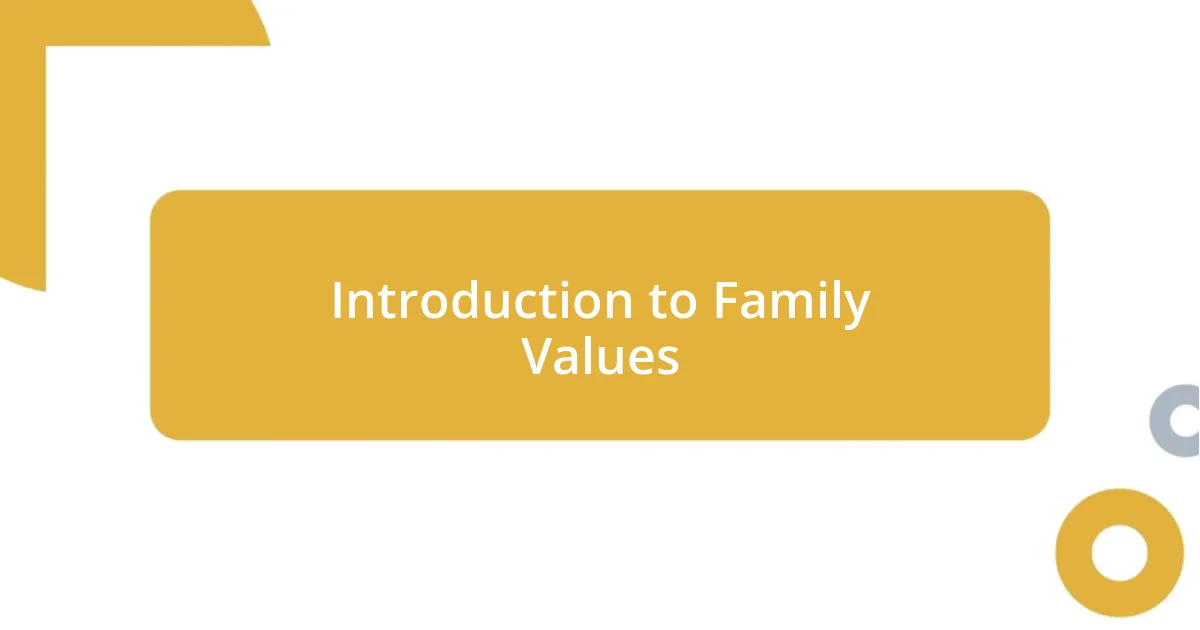
Introduction to Family Values
Family values are the principles and beliefs that guide how we interact with each other and navigate the world around us. Growing up, I vividly remember family gatherings where storytelling and laughter filled the air. Those moments taught me that connection and understanding are the cornerstones of a strong family dynamic.
Think about your own family—what values do you cherish most? For me, trust and support have always stood out. I recall a time when I faced a tough decision, and my family’s unwavering belief in me gave me the courage to move forward. It’s in moments like these that we truly see the depth of our family values in action.
As I reflect on my journey, I realize that family values are not static; they evolve as we do, shaped by our experiences and the lessons we learn. It’s fascinating how they weave into the fabric of our lives, often guiding our choices and relationships, don’t you think? Seeing these values portrayed in animated movies has a unique way of reinforcing what’s important in our family life.
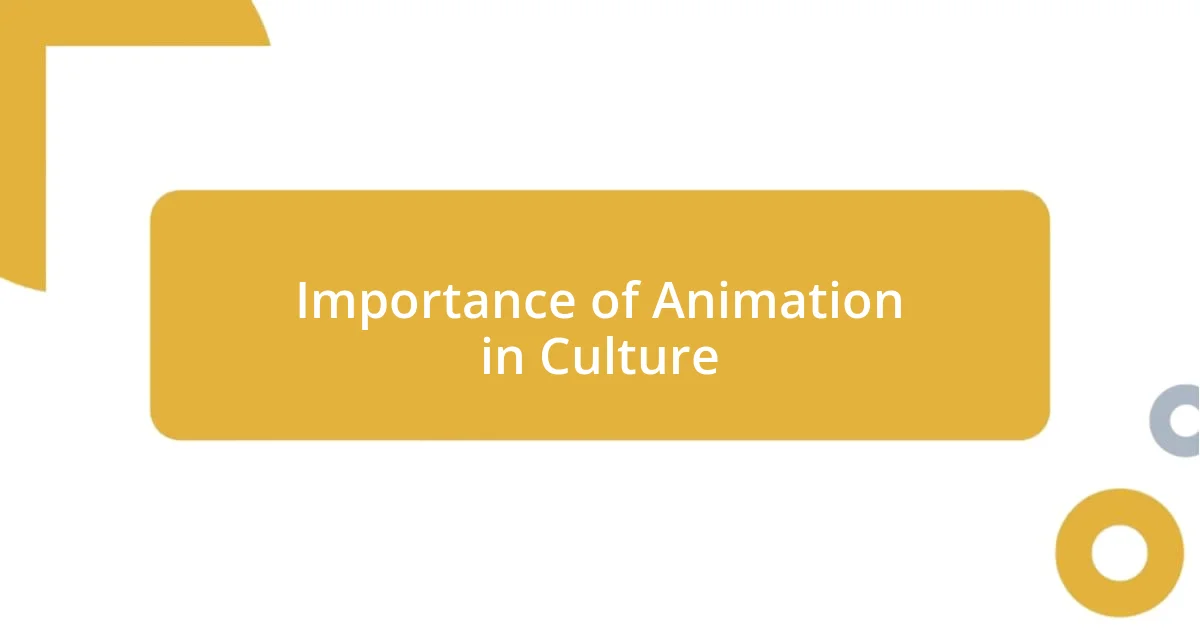
Importance of Animation in Culture
Animation plays a pivotal role in shaping cultural narratives, as it often reflects the shared experiences, struggles, and triumphs of various communities. Through vibrant characters and relatable stories, animated films can transcend language barriers and societal divides, creating a universal understanding of values such as love, resilience, and friendship. For instance, the way “Inside Out” delves into emotions has always resonated with my family, helping us articulate feelings we often struggled to express.
Here are some critical aspects of how animation influences culture:
- Representation: Animated films showcase diverse cultures and perspectives, helping audiences feel seen and understood.
- Morals and Lessons: Stories often carry valuable life lessons, encouraging reflection on personal and societal values.
- Influence on Youth: Children absorb values from animation, shaping their understanding of empathy and kindness from an early age.
- Cultural Preservation: Many animated films celebrate folklore and traditions, preserving and promoting cultural heritages for future generations.
I remember watching “Coco” with my kids and how it sparked conversations about our own family traditions. That experience felt transformative, bridging the gap between generations as we explored our heritage together.
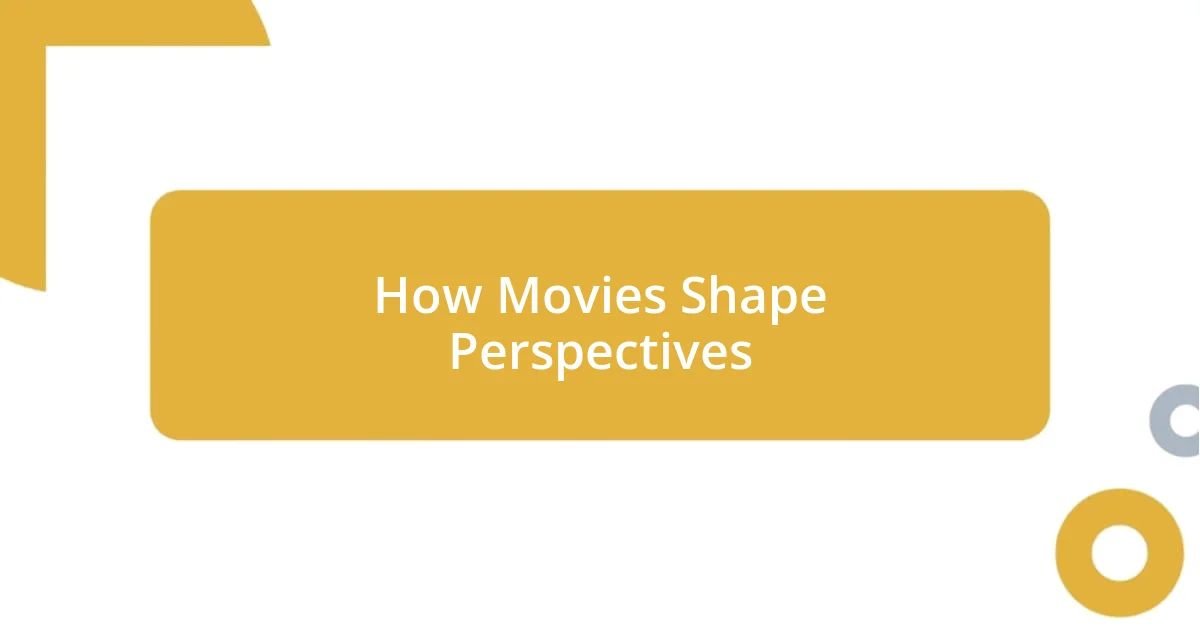
How Movies Shape Perspectives
Animated movies have an incredible ability to shape our perspectives by providing relatable narratives that highlight essential values. I recall the first time I watched “Zootopia” with my family. The movie sparked meaningful discussions about the importance of teamwork and the acceptance of differences in our own lives. It was a refreshing reminder that, despite our varied backgrounds, we all have a shared goal of creating a harmonious community.
In my experience, animated films often shine a light on real-world issues that we might be hesitant to discuss. Take “Ratatouille,” for instance; the story of a rat aspiring to be a chef challenged my children to think beyond stereotypes and embrace ambition, regardless of perceived limitations. After we watched it, my youngest shared her dream of becoming a scientist, unafraid to pursue her passion, which felt like a beautiful alignment of the lessons drawn from the film.
Another aspect worth considering is how these movies foster empathy. When I watched “Big Hero 6,” the bond between Hiro and Baymax made me think about how technology can enhance our relationships. It encouraged discussions around how we can support each other, even in difficult times. I noticed my family becoming more attuned to each other’s emotions, inspired by the kindness embodied in the film.
| Aspect | Example |
|---|---|
| Relatable Narratives | “Zootopia” fostering conversations about teamwork |
| Challenging Stereotypes | “Ratatouille” inspiring ambition beyond limitations |
| Fostering Empathy | “Big Hero 6” encouraging emotional support in difficult times |
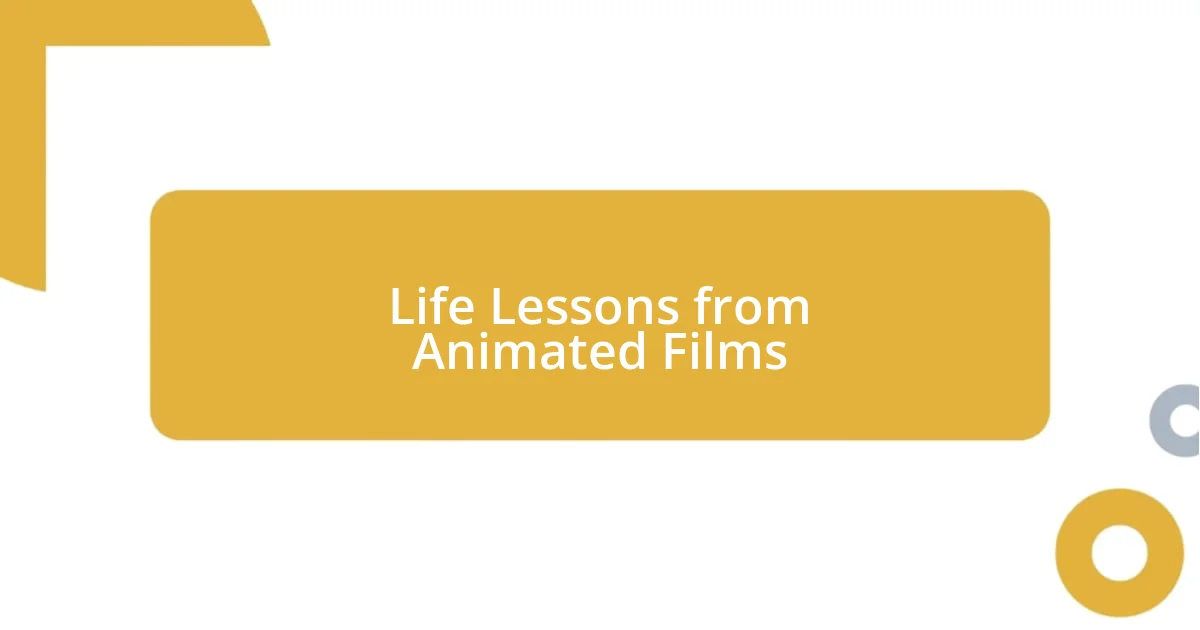
Life Lessons from Animated Films
Animated films are often treasure troves of life lessons that resonate deeply within families. I remember one evening when my kids and I sat down to watch “Finding Nemo.” The journey Marlin undertakes to find his son was not just a captivating adventure; it brought to light themes of perseverance and trust. As Marlin faced fears and formed bonds, we chatted about how important it is to have faith in each other, even when the journey gets tough.
Another instance that struck a chord with my family is “The Lion King.” The concept of responsibility, portrayed through Simba’s growth, made us reflect on our roles within the family. After the movie, we had a heartfelt discussion about how every member contributes to the family’s success and happiness. It was enlightening to hear my daughter express how she wants to be a supportive sister, showing how animated stories can inspire self-reflection in unexpected ways.
I also find it fascinating how animated films can teach us about the importance of embracing our uniqueness. Watching “Monsters, Inc.” with my family sparked a conversation about celebrating differences. As we laughed at the quirky characters, we connected their antics to our own quirks and realized how our individuality contributes to our family’s strength. Isn’t it remarkable how these colorful stories can turn into powerful lessons about acceptance and love?
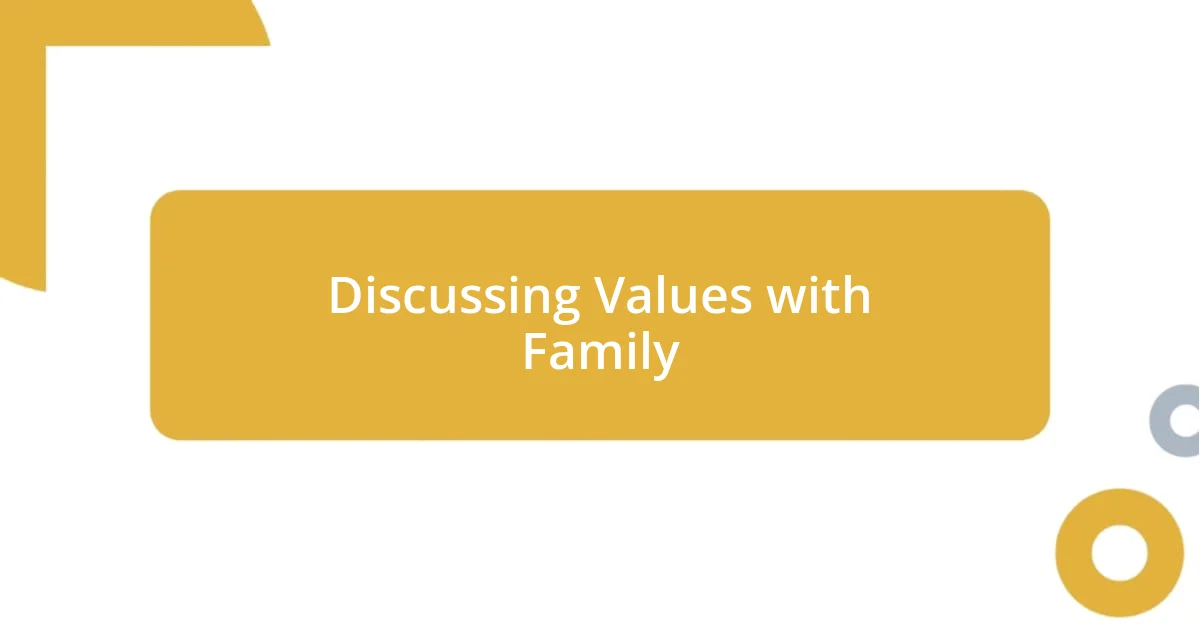
Discussing Values with Family
Discussing values with my family becomes a natural experience after watching animated films together. I remember a cozy weekend when we sat down for “Inside Out.” This movie opened up a dialogue about emotions and how each feeling plays a role in our lives. My son started sharing how he sometimes feels “sad” when he’s worried about school, and we explored the importance of expressing our feelings instead of bottling them up. It was a proud moment for me, witnessing my children connect their own experiences to what they saw on-screen.
Another time, we gathered to watch “Coco,” which beautifully highlights family and remembrance. As the characters navigated their family’s legacy, we began to share stories about our ancestors and the values they’ve passed down. I couldn’t help but feel a wave of nostalgia as my daughter expressed how important it is to carry our family traditions forward. Doesn’t it warm your heart when a film inspires conversations that strengthen family ties?
Sometimes, the discussions sparked by animated movies lead to unexpected revelations. After enjoying “Kung Fu Panda,” my kids and I began dissecting the idea of finding one’s true self. It was fascinating when my daughter shyly admitted she sometimes feels pressure to fit in, while my son proudly claimed he loves being unique. Engaging in these conversations taught us that embracing our individuality is not just acceptable—it’s genuinely valuable. Isn’t it powerful how animated films can be the gentle push we need to explore deeper conversations about who we are?
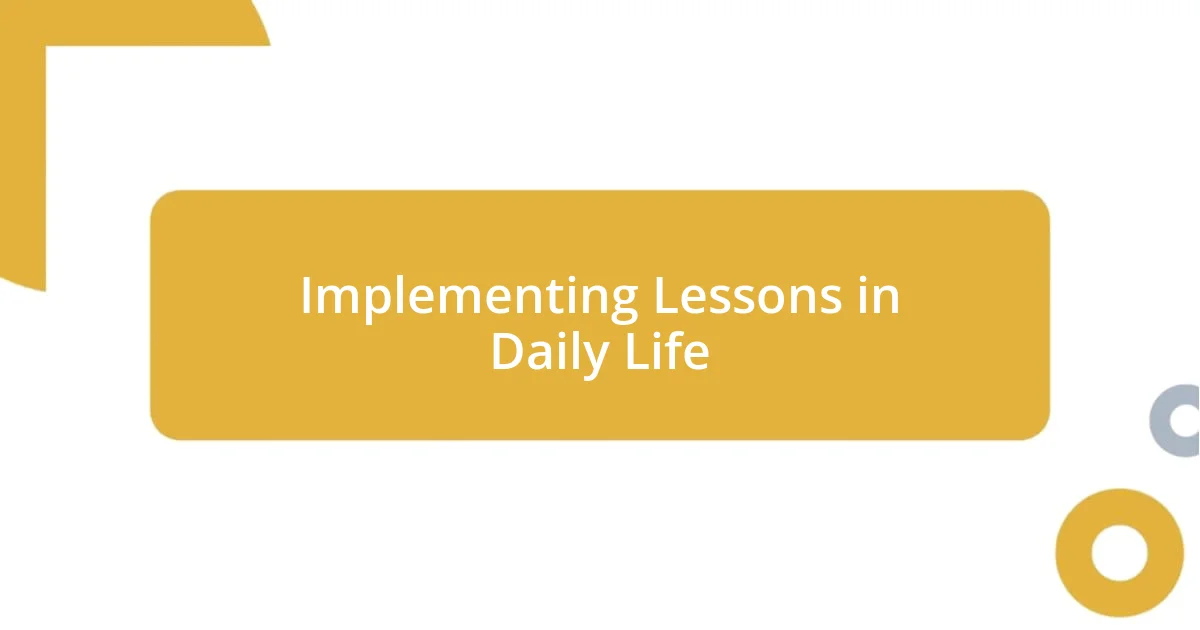
Implementing Lessons in Daily Life
Incorporating the lessons we learn from animated films into our daily lives has made a significant impact on our family dynamics. For instance, after watching “Zootopia,” we started a weekly family night where everyone shares their ideas and experiences, no matter how small they seem. This simple practice has really opened the door to honest conversations, teaching us that every voice matters, just like the characters in the film who united despite their differences.
I remember one morning when my son was feeling demotivated about a school project. Channeling what we learned from “Ratatouille,” I encouraged him by sharing, “Anyone can cook, but only the fearless can be great.” We decided to tackle the project together, turning it into a fun cooking experiment that aligned with our interests. Seeing the joy on his face reminded me that tackling challenges can be seen as an adventure, much like in the movies we love.
Sometimes, it’s the small gestures inspired by these films that resonate the most. After watching “Toy Story,” my daughter surprised me by organizing a toy donation drive in our neighborhood. She explained that just like Woody and Buzz learned to share and care for each other, we, too, can help others by spreading joy and kindness. Isn’t it fascinating how animated stories can motivate us to take action and instill values in our everyday lives?















